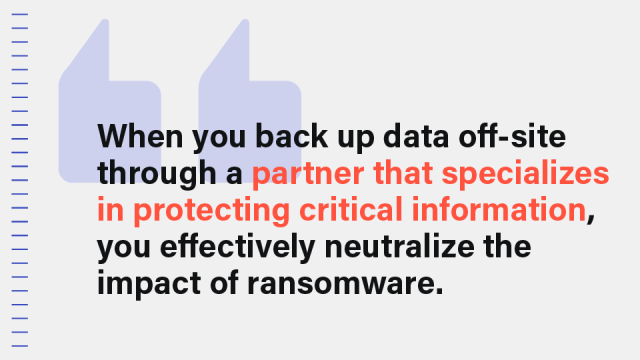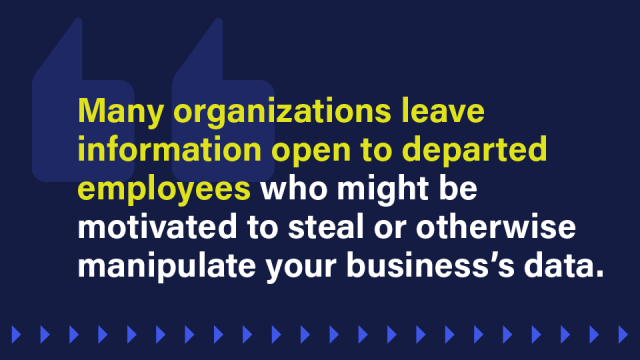Small businesses are not immune to cyberattacks. In fact, they’re prime targets for data thieves. What can owners and employees do to protect their critical data? One good place to start is to follow these cybersecurity tips for businesses like yours.
The fact is that most small businesses just don’t have the resources to manage cybersecurity, which can be a gargantuan task even for large companies. After all, 80% of small and medium-sized businesses (SMBs) have no more than one employee dedicated to security. Almost 40% have no security-focused staffers at all.
It’s no wonder that 61% of SMBs have suffered a successful cyberattack in the last year. Almost 40% of attack victims reported losing customer data. A cyberattack really can kill your business. One survey revealed that 75% of SMBs would survive only three to seven days after a ransomware attack.
And customers pay attention to cybersecurity issues, too. More than one in five stopped doing business with a company that suffered a data breach.
Despite all the scary statistics, though, there is hope. You can protect your critical data and keep your business safe by following a few basic cybersecurity tips for businesses.
Implement employee security training programs
Technology is important, of course, for protecting your business. However, your employees are still your last and best line of cybersecurity defense. Verizon’s industry-standard report on data breaches revealed that 74% of all data breaches included the “human element,” usually someone in an organization clicking on a malicious link.

A comprehensive report from Comcast showed that almost 90% of tactics used to gain initial access to networks were phishing emails. In other words, most cyberattacks start with an ill-advised click on a link that installs malware on your network and starts stealing data. When you and your employees know how to avoid clicking on phishing links, you greatly reduce your risk of suffering a cyberattack.
That’s why training employees to avoid cyberthreats is so important. In fact, Verizon’s top recommendation for keeping SMBs safe is to provide cybersecurity training to staffers. If you and your employees never set off a cyberattack, data thieves will find stealing your critical information to be exceedingly difficult. That’s exactly what you want.
Ensure your data is backed up regularly
Some cyberattackers will hold your data hostage and issue an ultimatum: Pay a hefty sum, and they’ll return your critical information. Even then, some victims don’t get their data back after forking over a ransom. And the attackers can still sell your data to other criminal outfits in the meantime.
But none of that works out quite so well for cybercriminals if your data is backed up in an enterprise-class facility with a third-party security partner. When you back up data off-site through a partner that specializes in protecting critical information, you effectively neutralize the impact of ransomware.

After all, if you can still access your data after a bad actor claims to have stolen it, you don’t need to pay a ransom to get it back. Beyond that, a security partner can help prevent a ransomware attack from happening. They do this by filtering out phishing emails and studying messaging patterns to make sure malicious links don’t get to you in the first place.
Of course, with security training in place, you and your employees should be able to avoid inadvertently launching malware on your network and putting your data at risk. But having critical data always available—even in a nightmare scenario—could be the difference between your business surviving an attack and not surviving one.
Limit employee access to sensitive information
You hire employees with the confidence that you can trust them to protect your business’s most important data. The issue with which pieces of data employees can and cannot access isn’t so much one of trust. Rather, it’s a pragmatic cybersecurity concern.
In an ideal world, your well-trained employees won’t click on a malicious link or fall victim to a cyberattack. But if it happens, you want the cyberattacker to have as little access to your business’s information as possible. If a cybercriminal does manage to breach an employee’s account, you can limit the information the attacker has access to. And you can do this by limiting what the employee has access to in the first place.
In other words, an employee who works strictly for two specific customers only needs to see data related to those customers. It’s an even bigger issue when onboarding—and particularly offboarding—an employee. Many organizations leave information open to departed employees who might be motivated to steal or otherwise manipulate your business’s data.

In one survey, almost half of respondents said they believed former employees and contractors still had access to business data. That’s a potentially dangerous situation for any business. With the right security partner, you can easily onboard and offboard employees. You can show them only the data they need to see and then cut access when they leave your organization.
The right partner can help you follow cybersecurity tips for businesses
Consider partnering with a company that will back up and protect your critical information around the clock. As much as we wish it wasn’t so, your small business is in the crosshairs of cybercriminals. With the right security partner, you’ll be ready for them with continually updated cybersecurity tips to keep your business data safe. And then you can get on with your most important work—running your successful operation.
Don’t leave your business at risk any longer. Secure your data today.


